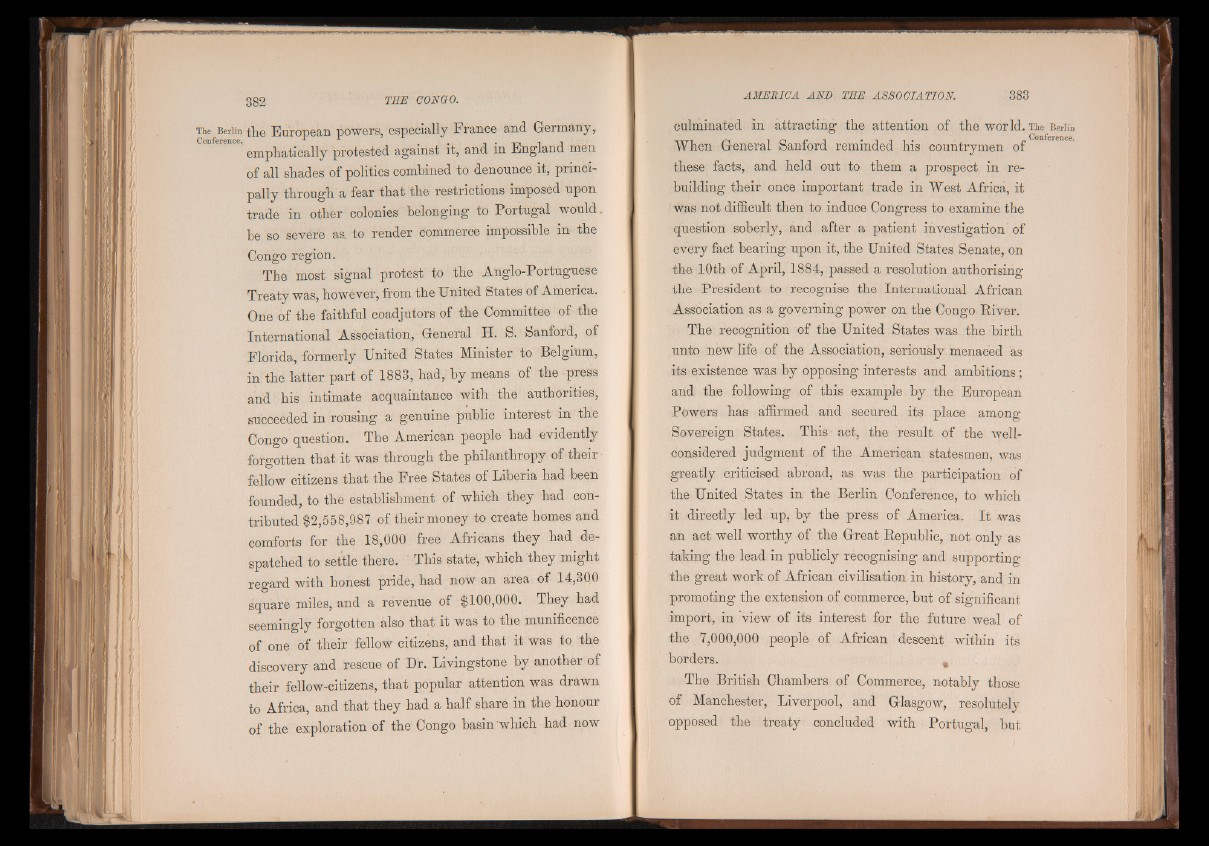
The Berlin -¡^e European powers, especially France and Germany,
Conference. # -i • -n i J emphatically protested against it, and m England men
of all shades of politics combined to denounce it, principally
through a fear that the restrictions imposed upon
trade in other colonies belonging to Portugal would,
he so severe as. to render commerce impossible in the
Congo region.
The most signal protest to the Anglo-Portuguese
Treaty was, however, from the United States of America.
One of the faithful coadjutors of the Committee of the
International Association, General H. S. Sanford, of
Florida, formerly United States Minister to Belgium,
in the latter part of 1883, had, by means of the press
and his intimate acquaintance with the authorities,
succeeded in rousing a genuine public interest in the
Congo question. The American people had evidently
forgotten that it was through the philanthropy of their
fellow citizens that the Free States of Liberia had been
founded, to the establishment of which they had contributed
$2,558,087 of their money to create homes and
comforts for the 18,000 free Africans they had despatched
to settle there. This state, which they might
regard with honest pride, had now an area of 14,300
square miles, and a revenue of $100,000. They had
seemingly forgotten also that it was to the munificence
of one of their fellow citizens, and that it was to the
discovery and rescue of Dr. Livingstone by another of
their fellow-citizens, that popular attention was drawn
to Africa, and that they had a half share in the honour
of the exploration of the Congo basin which had now
culminated in attracting the attention of the world. The Berlin
When General Sanford reminded his countrymen of
these facts, and held out to them a prospect in rebuilding
their once important trade in West Africa, it
was not difficult then to induce Congress to examine the
question soberly, and after a patient investigation of
every fact bearing upon it, the United States Senate, on
the 10th of April, 1884, passed a resolution authorising
the President to recognise the International African
Association as a governing power on the Congo River.
The recognition of the United States was the birth
unto new life of the Association, seriously menaced as
its existence was by opposing interests and ambitions;
and the following of this example by the European
Powers has affirmed and secured its place among
Sovereign States. This act, the result of the well-
considered judgment of the American statesmen, was
greatly criticised abroad, as was the participation of
the United States in the Berlin Conference, to which
it directly led up, by the press of America. It was
an act well worthy of the Great Republic, not only as
taking the lead in publicly recognising and supporting
the great work of African civilisation in history, and in
promoting the extension of commerce, but of significant
import, in view of its interest for the future weal of
the 7,000,000 people of African descent within its
borders.
The British Chambers of Commerce, notably those
of Manchester, Liverpool, and Glasgow, resolutely
opposed the treaty concluded with Portugal, but